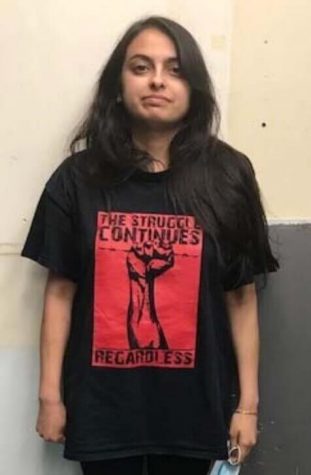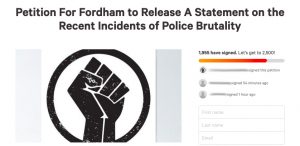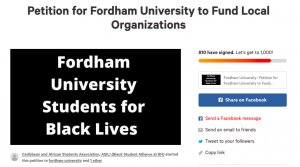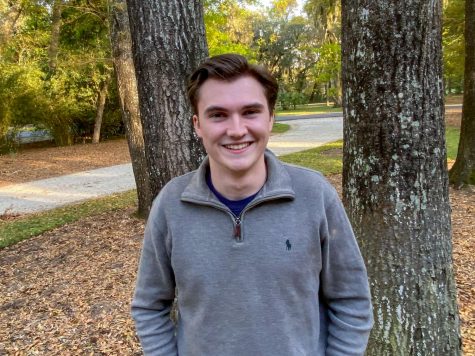Fordham Alum Charged in NYPD Attack During Black Lives Matter Protest
June 3, 2020

A Fordham alumna, Urooj Rahman, Fordham College at Lincoln Center ’11 and Fordham Law ’15, was arrested in New York City on May 30 for allegedly throwing a Molotov cocktail, a type of homemade firebomb, at an unoccupied New York City Police Department (NYPD) cruiser during the Black Lives Matter protests.
Rahman is a human rights lawyer at Bronx Legal Services, working to defend low-income tenants facing eviction. She was arrested with another lawyer, Colinford King Mattis, with the firm of Pryor Cashman LLP.
Rahman first graduated from Fordham in 2011 with a Bachelor of Arts in political science. She began at Fordham Law in 2012 and graduated with a Juris Doctor in 2015.
An NYPD surveillance camera recorded the incident, and both Rahman and Mattis were later found in a van with supplies for making the Molotov cocktails, including toilet paper, a Bud Light beer bottle and what is suspected to be gasoline, according to a U.S. Department of Justice news release.
Rahman and Mattis were arrested on federal charges for being in possession of explosive device components and for causing damage to a police vehicle by fire and explosives.
Since Rahman is a resident of Brooklyn, where the attack occurred, she did not travel across state lines to incite violence, which is a federal crime. Rahman was born in Pakistan but grew up in Bay Ridge and has been working for Bronx Legal Services for almost a year. Her friend Salmah Rizvi told Gothamist, “She’s never promoted violence and she’d never harm another human being.”
The Observer reached out to Rahman for comment but did not receive a response.
On Monday, June 1, both Rahman and Mattis were released on bond after each meeting the $250,000 bail set by a magistrate judge. They are also subject to home detention and electronic monitoring. On Tuesday, June 2, federal prosecutors asked a federal appeals court to halt this decision and return them to custody. According to the court document, “No electronic monitoring or apartment door can adequately safeguard the community against individuals with that mindset.”
Both of the attorneys were participating in the protests that have erupted in all 50 states over the death of George Floyd during an arrest by four members of the Minneapolis Police Department. Many of these protests have been violent, including the use of force by police to disperse crowds. Whether police or protestors have been responsible for initiating the violence has been disputed.
Both sides of the political spectrum, including Democratic Minnesota Gov. Tim Walz and Republican President Donald Trump, have blamed the violence on outside agitators from out of state. However, while Walz suggested that it was the work of white nationalists, Trump has denied the involvement of white nationalists and instead blamed antifa, a term that stands for “antifascist” and is often used to describe a collection of far-left organizations that frequently use violence to counter-protest.
According to a Federal Bureau of Investigation (FBI) report obtained by The Nation, the FBI does not have any evidence that antifa groups carried out any violence at the protests over the weekend. The Bureau report did warn, however, that individuals in a far-right social media group were calling for violent acts against protestors and law enforcement.
In cities around the country, the vast majority of protestors have been peaceful, with occasional looting and other property damage occurring mostly at night. Many cities, including New York, have instituted curfews in an attempt to prevent further destruction.
Update June 5, 2020: After a viral Tweet on June 3 from Andy Ngo, a journalist with the conservative Canadian publication The Post Millennial, Rahman has been subjected to significant online harassment. Commenters have called for her deportation (despite a lack of clarity regarding her immigration status) and have launched attacks on her race and perceived religion, as well as criticized Fordham for her education. Some commenters have even made public death threats.













John • Jun 14, 2020 at 11:41 pm
I don’t know what is happening to this world, but every day lately seems to be “opposites day”…. the whole world is going crazy. I am the child of an immigrant, came to this country with an 8th grade education in the 1950’s. While still in his green card he was drafted and sent to Korea. When he came home he got his GED and then joined the NYPD, went to college on the GI Bill, and served 38 years, moving up the tabs the whole time. My Dad went out everyday to serve the country/people he loved so much. While the NYPD is not perfect, no company or organization is. The police officers go out every day, putting their lives on the line to protect the citizens. Just remember that during 911 the NYFD & NYPD we’re running into a burning building to save others, while everyone else were running out to save their own lives. What I find stunning is how the police are vilified by the media, and no matter what the situation, you paint them as the bad guys and the criminals as the victims. You spent most of your article building these two criminals up to be these great martyrs, compelled to break the law because of the big bad cops. I have never seen the media invest the same time to build up the cops background and try to compel everyone to forgive “this one mistake”…. even when it’s not a mistake and they were put in a bad situation that forced them to make a tough decision. These two “criminals” like my Dad should be considered great American success stories. They had little when growing up, worked real hard by going to school to get a good education and had great careers. When they decided that they were not happy with how America works (where else in the world could they have had a similar opportunity to make something of themselves… nowhere!! In stead of taking what sounds like to very smart minds and tried working with their community and their local police precinct, they decide to throw bombs at them instead. How throwing bombs at police, defunding police departments, demonizing people that everyday put their lives on the line for their communities…. where a decent percentage of them hate the police, they went to the police and said “how can we help”. If they did that, maybe they wouldn’t be going to jail, lose their license to practice friends and maybe, just maybe they could have helped this situation instead of just making it worse.
Samantha • Jun 14, 2020 at 11:37 am
If you want more background, there is a video interview of Urooj with Loudlabs News, and the words straight from her mouth are quite indicative.
Fast forward link to the interview is here: https://www.youtube.com/watch?v=vazxHrxH7yY&feature=youtu.be&t=4781
More about her time at Fordham Law School is also described the news report.https://conservativechoicecampaign.com/urooj-rahman-molotov-lobbing-attorney/?utm_source=whatfinger
Jack Manley • Jun 13, 2020 at 11:06 am
She was a classmate and friend. Smart, kind, really stellar in every way. This breaks my heart and shows how good people have been pushed to a breaking point. If anyone has info on where to donate to her legal fund/family I would appreciate it. As for the additional threats made towards her, that’s just gross. She grew up in Brooklyn! In no way do I condone violent actions, but if this promising, young lawyer felt she needed to do that in order to communicate, then I think that should be seriously telling of where we are. Please no hate here. Don’t blame Fordham. Everyone Blame yourself. This is on all of us. If you can’t understand that, please don’t even engage with me.
EMPATHY
Samantha • Jun 9, 2020 at 10:10 pm
Who provided the bail? It would not be a minor matter if a certain group provided the funding.
George Thomas McLaughlin • Jun 5, 2020 at 6:20 pm
My note today to Father McShane:
Nobody in his right mind thinks Mr. Floyd should have died. It is obviously terrible. Your condemnation includes this.
However, previously you forgot to also condemn the terrible attacks on businesses, police, civilians- mostly “white” European-Americans in Minneapolis, New York, Chicago, etc. but also Blacs, Hispanics and immigrants.
I was born and raised in Brooklyn, and I am disgusted with the phony NY politicians. Cowardly, godless miscreants spray painted obscenities on St. Patrick’s Cathedral and tried to do the same to or even burn down other churches and synagogues. They attacked and beat innocent individuals. You hadn’t mentioned these acts. A slight oversight?
Political correctness is not love. It is false love. And false love is equal to hate. It was easy to be liberal when you were far away from the problem. NOW you care about people and property in the community? Maybe it’s because the mob is outside your door. It’s when they are far away from your door that your voice is genuine.
You just lost me.
George Thomas McLaughlin
Fordham Alumnus
Ian • Jun 5, 2020 at 6:31 am
These people are a waste of space on this planet and should be locked up for a long time.
Dr Bob • Jun 4, 2020 at 9:11 am
Hopefully they will lose their law licenses for ever.
Amazing that intelligent people could destroy the property of completely innocent individuals.
As if all “blues” are alike!
Disgraceful.
Dora Angstrom • Jun 4, 2020 at 1:25 am
Fordham Sucks.
Fordham is the same University that hired OSU’s T-Shirt dean.
They also didn’t help with the Notre Dame Fire.
Noreen Rafferty • Jun 3, 2020 at 10:39 pm
Very disappointing to see a Fordham alum cause this destruction and harm.